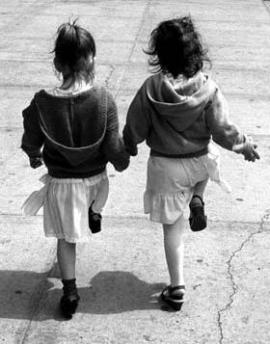School:
Where I First Learned I Was Wrong
The first time I was shamed for same-sex attraction, I was seven years old. I was in second grade, and we were all headed outside for something or other, maybe recess or story time. Either way, it was a sunny, beautiful day. I was walking with my friend, Cassi, and I wanted to hold her hand. Apparently, she wanted to hold mine, too, because we did. With her tiny hand in my own, I felt happy. Proud, even. I liked her and it seemed she liked me back. I couldn’t stop smiling.
It didn’t last long, though. Mrs. Schmidt, our teacher, was quick to break it up. “I know you’re friends…” she disapproved, adding something about being ‘big girls now’ for extra shame. That was the last time Cassi and I ever held hands, but far from the last time someone told me my feelings were wrong. Growing up in southern churches, I got every indication who I was would take me to hell.
“God” hated that part of me, and it was something to hide and play down. Something to keep secret from relatives, to be dismissed as a phase whenever these feelings would surface. Never something to be acknowledged and certainly nothing to be celebrated. Who I was was sinful, and that “sin” had to be kept secret.
From one mouth to another, the message echoed – who I was was not okay. The more sure I became of myself, the more I felt I had to hide. As I found more of my truth, I had to tell more lies to keep it safe. It wasn’t easy, but the effort in keeping it tucked away was rewarded with approval from those around me, something that felt essential in my developmental years. It almost seemed worth it, hiding myself to feel moderately accepted. I always felt like I was holding back, though, holding my breath, and it took its toll on me.
I wasn’t doing anything wrong holding Cassi’s hand. At seven years old, I had no concept of sexual identity or stigma. I was just expressing how I felt for her – affection and attraction in the purest form. There was nothing wrong or sick about it. There was nothing to be corrected. In a southern, conservative school, though, it just couldn’t be allowed.
At such a young, malleable age, I was taught my feelings were wrong, just as I was discovering them. The fascinating things I was experiencing, the purest beginnings on my part of the ability to love another person were tainted. Tinged by a notion of wrongness almost as quickly as I had found them.
Adding to the confusion, any attraction to males I displayed was accepted and labeled ‘adorable’ or ‘cute’. It was fine – even encouraged – to show affection for a boy. Any intimacy of the same kind with a girl, though? Instant, overwhelming disapproval.
Growing up bisexual, I’ve been on the receiving end of these mixed signals all my life. Heck, I’m still getting them, some from the people closest to me. One thing has changed about it, though. I’m done letting it get to me. The labels, signals, defense mechanisms of the unenlightened no longer control how I feel about myself or who I love.
If I could go back to seven-year-old me, I would tell her this. I’d tell her some people just hate for no good reason, that there’s nothing wrong with her and to keep on keeping on. I wish I could go back in time and pat myself on the back for holding a cute girl’s hand. I’d tell her how great she is for expressing her feelings and to ignore her bigoted teachers. I’d make it clear that, while something is definitely wrong in this situation, it’s not her. That some people hold ideas about love and morality that just don’t add up. I’d tell her not to let their hate shame her into hiding. I’d tell her love is about being with who makes you happy, not who other people think you should be with. Most importantly, I’d make sure she knows she can hold whoever’s hand she wants.
-Alie Butler
